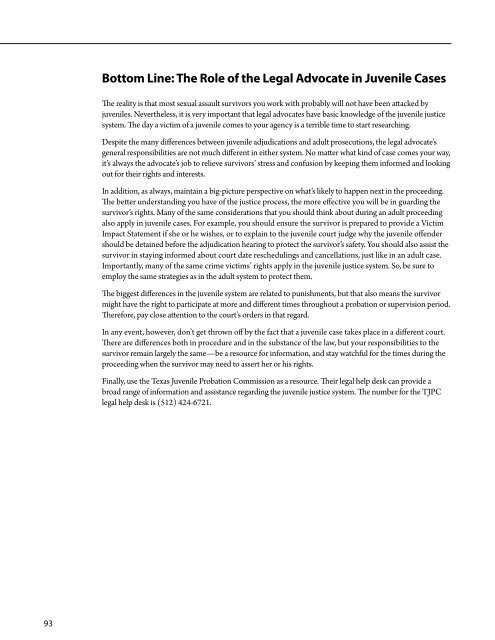Sexual aSSault LEGAL ADVOCACY MANUAL - Texas Association ...
Sexual aSSault LEGAL ADVOCACY MANUAL - Texas Association ...
Sexual aSSault LEGAL ADVOCACY MANUAL - Texas Association ...
You also want an ePaper? Increase the reach of your titles
YUMPU automatically turns print PDFs into web optimized ePapers that Google loves.
Bottom Line: The Role of the Legal Advocate in Juvenile Cases<br />
The reality is that most sexual assault survivors you work with probably will not have been attacked by<br />
juveniles. Nevertheless, it is very important that legal advocates have basic knowledge of the juvenile justice<br />
system. The day a victim of a juvenile comes to your agency is a terrible time to start researching.<br />
Despite the many differences between juvenile adjudications and adult prosecutions, the legal advocate’s<br />
general responsibilities are not much different in either system. No matter what kind of case comes your way,<br />
it’s always the advocate’s job to relieve survivors’ stress and confusion by keeping them informed and looking<br />
out for their rights and interests.<br />
In addition, as always, maintain a big-picture perspective on what’s likely to happen next in the proceeding.<br />
The better understanding you have of the justice process, the more effective you will be in guarding the<br />
survivor’s rights. Many of the same considerations that you should think about during an adult proceeding<br />
also apply in juvenile cases. For example, you should ensure the survivor is prepared to provide a Victim<br />
Impact Statement if she or he wishes, or to explain to the juvenile court judge why the juvenile offender<br />
should be detained before the adjudication hearing to protect the survivor’s safety. You should also assist the<br />
survivor in staying informed about court date reschedulings and cancellations, just like in an adult case.<br />
Importantly, many of the same crime victims’ rights apply in the juvenile justice system. So, be sure to<br />
employ the same strategies as in the adult system to protect them.<br />
The biggest differences in the juvenile system are related to punishments, but that also means the survivor<br />
might have the right to participate at more and different times throughout a probation or supervision period.<br />
Therefore, pay close attention to the court’s orders in that regard.<br />
In any event, however, don’t get thrown off by the fact that a juvenile case takes place in a different court.<br />
There are differences both in procedure and in the substance of the law, but your responsibilities to the<br />
survivor remain largely the same—be a resource for information, and stay watchful for the times during the<br />
proceeding when the survivor may need to assert her or his rights.<br />
Finally, use the <strong>Texas</strong> Juvenile Probation Commission as a resource. Their legal help desk can provide a<br />
broad range of information and assistance regarding the juvenile justice system. The number for the TJPC<br />
legal help desk is (512) 424-6721.<br />
93
















